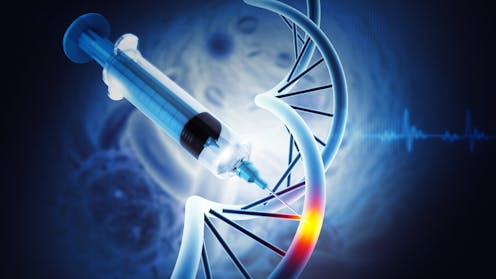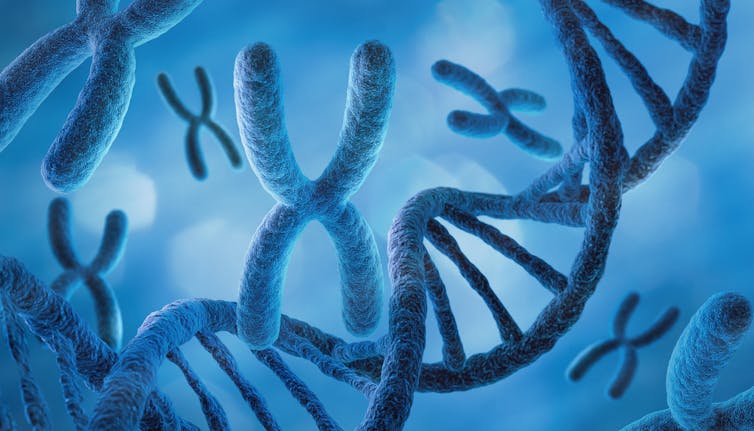Source: ForeignAffairs4
Source: The Conversation – UK – By Alison Clare, Senior Research Associate, Translational Health Sciences and Ophthalmology, University of Bristol

Gene therapies hold immense promise for treating sight loss. These therapies use a modified, harmless virus to deliver therapeutic genes directly to diseased cells, helping them to function normally again.
But numerous clinical trials have found that gene therapy causes serious side-effects in some patients because their immune system recognises the virus and attacks it.
So to improve safety and efficacy of gene therapy in the eye, my colleagues and I wanted to understand more about this immune response so we can someday prevent it from happening.
We discovered that old female mice were more vulnerable to experiencing a damaging side-effect from gene therapy, compared to both male mice and young female mice. This reaction was directly related to differences in the way the immune systems of old female mice functioned.
To conduct our study, we gave both male and female mice the gene therapy, which was delivered into the eye. The therapy was tested on young, middle-aged and old mice.
We found that in young mice, females had increased immune activation – even from a lower dose of gene therapy. A similar finding was also recently observed in human blood samples – with women’s immune cells exhibiting greater amounts of inflammation, a sign these immune cells were mounting an attack against the therapy.
Our research went on to show that age was also associated with a stronger inflammatory response to the gene therapy. This was true for both old male and female mice. The inflammatory response lasted longer in the older mice, too.
When we looked more closely at a specific type of immune cell that’s found in the brain and eye, we saw that in older female mice these cells showed signs of both an earlier stress response and stronger inflammatory reaction compared to younger mice and male mice. This reaction was also linked to signs of tissue degeneration.
Together, these findings suggest that women, particularly older women, could be at greater risk of harmful reactions to gene therapy – especially at the doses needed for these therapies to work.
Although our study was conducted in mice, it’s not the first research to show that immune response differences can affect the way men and women react to certain treatments.
Another research group also showed that female mice mounted a stronger response against a gene therapy – recognising it as foreign and removing it. This reduced the amount of therapy delivered successfully to females compared to males.
Treatments for conditions such as arthritis are another example of the way women’s immune response can affect how they respond to treatment. These immunotherapies work better in men compared to women. Some scientists believe this is because women’s immune systems are more likely to recognise the drug as foreign and remove it.
Sex differences and immune function
There’s one key reason men’s and women’s immune systems may respond differently to the same treatment. Women’s immune systems are generally more reactive than men’s to anything unfamiliar.

Anusorn Nakdee/ Shutterstock
The types of immune cells that respond the strongest and fastest to a foreign substance are different for men and women. This is because sex hormones – primarily oestrogen for females and testosterone for males – directly affect the way these cells behave.
The X chromosome also plays a role in immune response, as it contains a greater number of immune-related genes compared to the Y chromosome. Females have two X chromosomes, while males have one X and one Y chromosome. These differences will affect how well men and women respond to treatments.
Read more:
How biological differences between men and women alter immune responses – and affect women’s health
Age further affects how the immune system acts – and how the body responds to different treatments.
As we get older, our immune cells lose their ability to recognise and remove foreign pathogens – though these cells still continue to stimulate inflammation. This leads to a persistent inflammatory state, which is thought to be involved in many age-related conditions – including cardiovascular disease and neurodegeneration.
Differences in immune cell function also become more evident for men and women after the age of 65.
In older men, their inflammatory immune cells are more active after the age of 65, while their adaptive immune cells (which coordinate the recognition and removal of foreign pathogens) are less active.
But as women age, their adaptive immune cell activity can stay the same. Having a stronger adaptive immune response increases the risk of autoimmune conditions – a condition that has been linked to certain neurodegenerative diseases.
These differences help explain why vaccines are less effective for older men because they have fewer functioning adaptive immune cells. They may also help to explain why the older female mice in our study had adverse reactions to the gene therapy, as their immune cells are more primed to attack.
Women have historically been underrepresented in biomedical research. Modelling everything on males has created a data gap in clinical translation, causing harm. For instance, women have nearly twice as many adverse reactions to a drug compared to men.
But studies like ours are helping to provide important insight into why certain medications are less effective in women – and how the immune system is implicated. Crucially, these findings can also help us identify new targets to explore for future treatments.
![]()
Alison Clare has received funding from the Wellcome Trust and the Medical Research Council. Her position is currently funded by National Institute for Health and Care Research (NIHR) Biomedical Research Center based at Moorfields Eye Hospital NHS Foundation Trust and UCL Institute of Ophthalmology.
– ref. Gene therapy can be less effective in women – and my research in mice brings us one step closer to understanding why – https://theconversation.com/gene-therapy-can-be-less-effective-in-women-and-my-research-in-mice-brings-us-one-step-closer-to-understanding-why-258135
